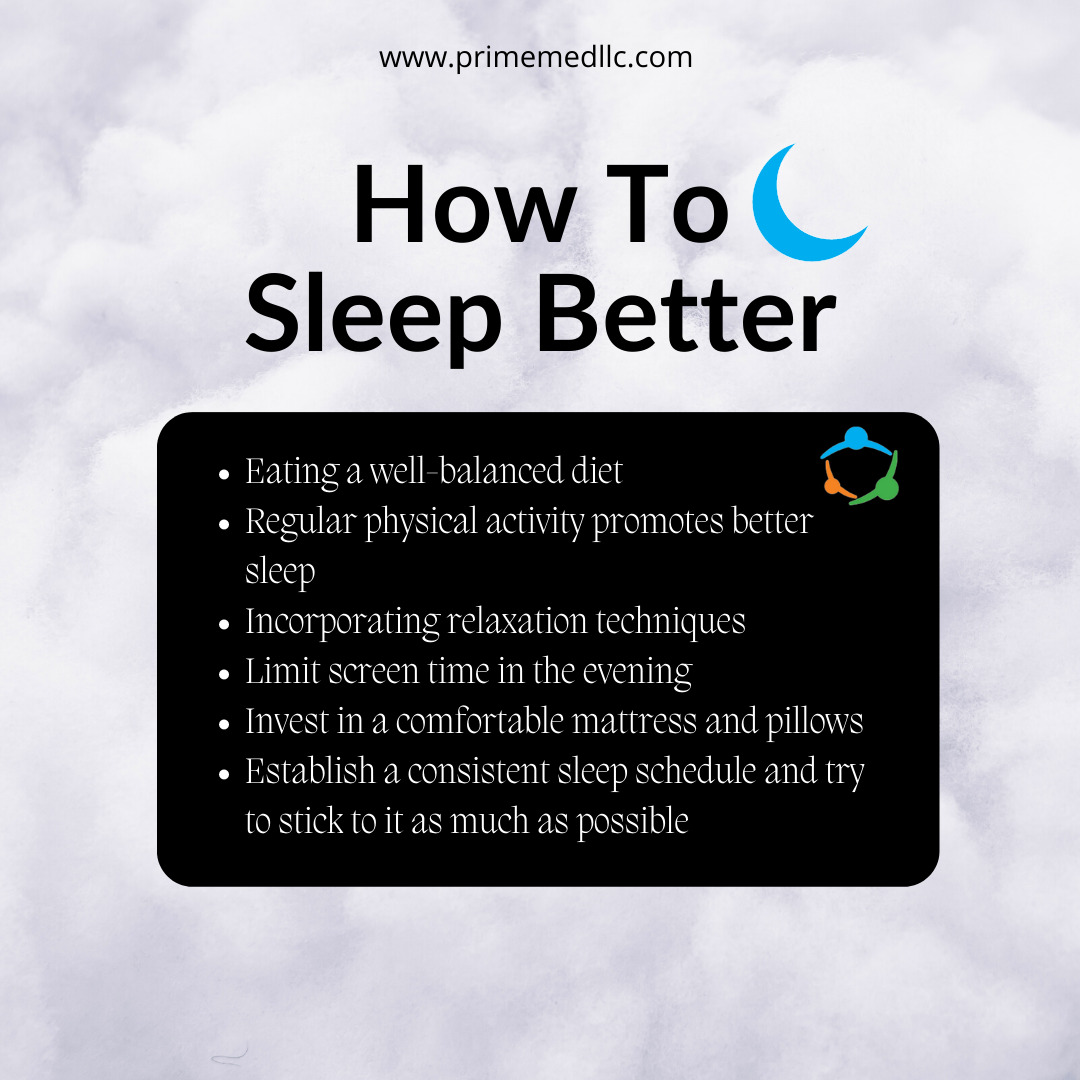
Sleep is an essential part of our lives, playing a vital role in maintaining our physical and mental well-being. However, our modern lifestyles often disrupt our natural sleep patterns, leading to various sleep-related issues. In this blog post, we will explore how lifestyle changes can significantly improve the quality of sleep and answer some common questions about sleep and its impact on our overall health.
How can lifestyle affect sleep?
Our daily habits and routines have a significant impact on our sleep quality. Factors like diet, exercise, stress levels, and exposure to screens can all influence our ability to fall asleep and stay asleep. By making conscious choices and adopting healthier habits, we can create an environment that promotes better sleep and improved overall health.
There are actions you can take in your own lifestyle to positively impact your sleep. This can even start with your morning routine, such as only having one to two cups of coffee before noon to ensure no caffeine will affect your sleep. Ideally, you want your mental state and physical state to be very relaxed upon bedtime. The steps you take prior to sleep will be important if you are trying to improve your sleep. If your mind is still racing and your body is still in motion, sleep will be impacted.
This goes to show how much your lifestyle can affect your sleep. Choosing to watch television before bed, instead of a book are small choices that can lead to a huge impact in your sleep.

Lifestyle factors affecting sleep quality
- Diet: Consuming large meals, caffeine, or alcohol close to bedtime can disrupt sleep. Eating a well-balanced diet and avoiding heavy, spicy, or sugary foods in the evening can help improve sleep quality.
- Exercise: Regular physical activity promotes better sleep, but exercising too close to bedtime may have the opposite effect. Aim to finish exercising at least two hours before bedtime to allow your body time to wind down.
- Stress: High stress levels can make it difficult to fall asleep and stay asleep. Incorporating relaxation techniques such as deep breathing exercises, meditation, or yoga into your daily routine can help manage stress and improve sleep.
- Screen time: Exposure to screens and bright lights before bedtime can interfere with the body’s natural sleep-wake cycle. Limit screen time in the evening and consider using blue-light filtering apps or devices to minimize the impact on your sleep.
- Sleep environment: Creating a comfortable, dark, and quiet sleep environment can significantly impact sleep quality. Invest in a comfortable mattress and pillows, use blackout curtains, and reduce noise levels with earplugs or white noise machines.
- Consistent sleep schedule: Going to bed and waking up at the same time every day, even on weekends, helps regulate your body’s internal clock and can improve sleep quality. Establish a consistent sleep schedule and try to stick to it as much as possible.
- Bedtime routine: Developing a calming bedtime routine can signal to your body that it’s time to wind down and prepare for sleep. Consider incorporating activities such as reading, taking a warm bath, or practicing gentle stretches to help relax your mind and body.
Best ways to help you sleep better
- Establish a consistent sleep schedule by going to bed and waking up at the same time every day, even on weekends.
- Create a relaxing bedtime routine, such as taking a warm bath, reading a book, or practicing mindfulness meditation.
- Limit exposure to screens and bright lights at least an hour before bedtime.
- Make your sleep environment comfortable, dark, cool, and quiet.
- Avoid heavy meals, caffeine, and alcohol close to bedtime.
Most beneficial way to sleep
The most beneficial way to sleep varies from person to person, but generally, it involves creating a consistent sleep schedule, following a relaxing bedtime routine, and ensuring a comfortable sleep environment. Prioritizing sleep and making it a non-negotiable aspect of your daily life will lead to better overall health.

Healthiest sleeping position: Right or Left?
The left side sleeping position is considered healthier for several reasons:
- Digestion: Lying on the left side allows gravity to facilitate the movement of food through the digestive tract, promoting smoother digestion and reducing the risk of gastrointestinal issues.
- Reduced acid reflux: Sleeping on the left side can reduce the likelihood of experiencing heartburn and acid reflux symptoms. This position prevents stomach acid from flowing back into the esophagus, providing relief for those with gastroesophageal reflux disease (GERD).
- Better blood circulation: The left side sleeping position allows for optimal blood flow from the heart to the rest of the body. This position helps in reducing the pressure on the heart and improving overall cardiovascular function.
- Lymphatic drainage: Sleeping on the left side promotes better lymphatic drainage, as the lymphatic system predominantly functions on the left side of the body. This position aids in the removal of toxins and waste products from the body more effectively.
- Pregnancy benefits: For pregnant women, sleeping on the left side can improve blood flow to the uterus and fetus, reducing the risk of stillbirth and other complications.
While the left side sleeping position offers numerous health benefits, it’s crucial to prioritize comfort and proper spinal alignment when choosing a sleeping position. If you find it uncomfortable to sleep on your left side, experiment with different positions, such as sleeping on your back with a pillow to support your knees or using a body pillow to maintain spinal alignment when sleeping on your side. Ultimately, a good night’s sleep is essential for overall health and well-being, regardless of which position you choose.
How does sleep help maintain a balanced lifestyle?
Sleep plays a crucial role in maintaining a balanced lifestyle by promoting physical recovery, supporting cognitive function, and regulating emotional well-being. By prioritizing sleep, we can improve our energy levels, productivity, and overall quality of life.
How does lifestyle affect insomnia?
Lifestyle factors like poor diet, lack of exercise, high stress levels, and excessive screen time can contribute to insomnia. By addressing these issues and adopting healthier habits, we can reduce the risk of developing sleep disorders and improve our overall sleep quality.
Three ways sleep benefits a healthy lifestyle
- Boosts immune system: Adequate sleep helps to strengthen our immune system, making us more resistant to illnesses and infections.
- Enhances cognitive function: A good night’s sleep improves memory, concentration, and decision-making abilities, contributing to better performance at work and school.
- Supports emotional well-being: Sleep helps regulate mood and reduces the risk of developing mental health disorders like anxiety and depression.
Improving the quality of sleep is essential for maintaining overall health and well-being. By making lifestyle changes and prioritizing sleep, we can enjoy numerous benefits, including increased energy, better cognitive function, and improved emotional stability. Start implementing these changes today and experience the transformative power of restorative sleep.
If you would like a sleep consultation, we would be happy to help you! Book your appointment today by calling 508-993-9760.
